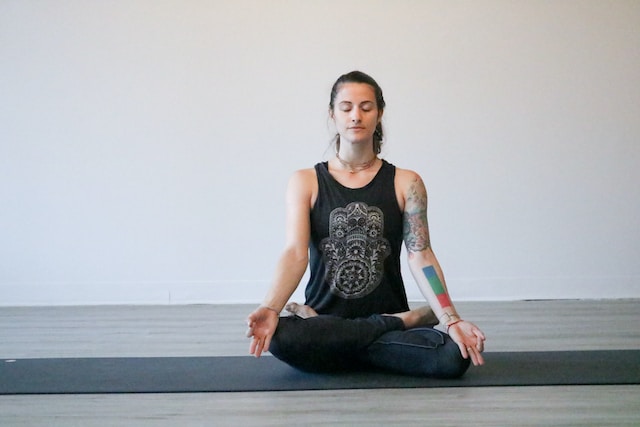
In this age of constant distraction, finding tranquility of mind before bedtime can be a formidable challenge. This is where the transformative power of meditation for sleep shines, offering a respite from the chaotic clamor and paving the way for a peaceful slumber.
Meditation, a practice as ancient as time itself, provides a priceless opportunity for introspection and calm contemplation. As you delve into this realm of self-discovery, you will unearth the secret to embracing restful sleep. This guide will serve as your trusted companion, leading you through the intricacies of the meditative journey towards a profound and rejuvenating snooze.
Without requiring any complex equipment or intricate rituals, meditation for sleep is accessible to all who seek respite from the insomnia-riddled nights. By gently directing our attention inward and anchoring ourselves in the present moment, we can cultivate an unwavering calmness that transcends the chaos of the external world. Through consistent practice and perseverance, we can unravel the deep-rooted tensions that gnaw at our minds, gradually paving the way to tranquility and, ultimately, transformative sleep.
Understanding Sleep Problems
In the realm of sleep, each night presents a unique challenge. From restless tossing and turning to the frustrating dance of insomnia, sleep problems can hijack our nights and leave us yearning for the elusive embrace of slumber. Understanding the nuances of sleep problems is the first step towards reclaiming our peace and embarking on a path of rejuvenating rest.
Insomnia
Insomnia, the most common sleep disorder, manifests as the persistent inability to fall asleep or stay asleep.
Causes: Stress, anxiety, irregular sleep schedule, medical conditions, caffeine consumption, and certain medications can all contribute to insomnia.
Solutions: Establishing a consistent sleep routine, creating a calm sleep environment, practicing relaxation techniques, and exploring meditation for sleep are all potential avenues for overcoming insomnia.
Sleep Apnea
Sleep apnea involves intermittent interruptions in breathing during sleep, leading to fragmented and poor-quality sleep.
Causes: Obstructive sleep apnea occurs when the airway is partially or completely blocked, while central sleep apnea results from the brain’s failure to signal breathing during sleep.
Solutions: Seeking medical evaluation and treatment options, including continuous positive airway pressure (CPAP) machines, lifestyle modifications, and weight management, can help alleviate sleep apnea symptoms.
Restless Leg Syndrome (RLS)
RLS is characterized by an irresistible urge to move the legs, often accompanied by an uncomfortable sensation that results in restlessness during sleep.
Causes: The exact cause of RLS is unknown, but it is often related to genetic factors, iron deficiency, nerve disorders, or certain medications.
Solutions: Engaging in regular exercise, practicing relaxation techniques, avoiding caffeine and tobacco, and discussing potential medications with a healthcare professional can reduce RLS symptoms.
Narcolepsy
Narcolepsy is a neurological disorder characterized by excessive daytime sleepiness and sudden bouts of sleep.
Causes: The exact cause of narcolepsy remains unknown, but it is believed to involve genetic and autoimmune factors.

Solutions: Medications, lifestyle modifications (such as maintaining a regular sleep schedule), and napping strategically throughout the day can help manage narcolepsy symptoms.
Circadian Rhythm Disorders
Circadian rhythm disorders occur when the body’s internal clock is misaligned with external time cues, making it difficult to fall asleep and wake up at desired times.
Causes: Shift work, jet lag, irregular sleep schedules, and certain medical conditions can disrupt the circadian rhythm.
Solutions: Implementing consistent sleep and wake times, exposing oneself to natural light, practicing relaxation techniques, and avoiding stimulants before bedtime can help regulate the circadian rhythm.
The Role of Meditation in Sleep Improvement
In the quest for quality sleep, meditation emerges as a powerful tool that harmonizes the mind, body, and spirit. Through its multifaceted approach, meditation offers a holistic solution for conquering sleep disturbances and fostering restful slumber. By exploring the profound benefits of meditation for sleep, we can unravel the intricate ways in which this ancient practice combines introspection and relaxation to transform our nightly experience.
Achieving Mental Stillness
In the midst of a chaotic world, our minds can become overwhelmed with thoughts, worries, and anxieties. This mental turmoil haunts our nightly endeavors to find peace in sleep.
Through consistent meditation practice, we embark on a journey of training the mind to settle, allowing the swirl of thoughts to gently dissipate. By cultivating mental stillness, we create a serene foundation for sleep to naturally unfold.

Letting Go of Stress and Anxiety
Stress and anxiety are notorious culprits that sabotage our ability to drift into a restful sleep. Through the gentle art of meditation, we learn the art of surrender, allowing these burdens to dissolve. By turning our attention inward, we are able to observe and release tension held within the body, easing the grip of stress and anxiety. Meditation becomes a sanctuary where we can nurture a tranquil state of being, paving the way for sleep’s gentle embrace.
Anchoring in the Present
In the frenzied pace of modern life, we often find ourselves lost in the past or consumed by worries about the future. This lack of presence steals away our ability to unwind and immerse ourselves in restorative sleep. Meditation empowers us to reclaim the present moment, anchoring our awareness in the here and now. By cultivating mindfulness, we heighten our ability to fully experience each breath, each sensation, and each peaceful moment, creating an ideal landscape for sleep to unfold.
Releasing Physical Tensions
Aches, pains, and physical tensions can become barriers to a blissful night’s sleep. Meditation offers a path to release these tensions, guiding us on an inward journey of body awareness and relaxation. By engaging in focused breathing exercises, gentle stretches, and body scans, we invite our muscles to surrender, allowing for deep rest to permeate our beings. Through the practice of meditation, we discover the art of physical relaxation, liberating our bodies from the clutches of discomfort.
Best Types of Meditation for Sleep
When it comes to meditation for sleep, there are various techniques and styles to explore. Each method offers its unique benefits, guiding us towards a state of tranquility and rest. Here, we delve into some of the best types of meditation for sleep, allowing you to choose the approach that resonates most with you.
Guided Visualization Meditation
Guided visualization meditation is a powerful technique that uses the imagination to create a serene mental landscape, promoting relaxation and sleep. It involves listening to a recorded voice guiding you through a calming scenario, encouraging you to visualize vivid and peaceful scenes.
Benefits:
- Helps to distract the mind from racing thoughts and worries, allowing for a peaceful transition into sleep.
- Enhances relaxation by engaging the senses and creating a soothing mental environment.
- Cultivates a sense of calm and tranquility, reducing anxiety and stress levels.
Body Scan Meditation
Body scan meditation is a mindfulness practice that involves systematically bringing awareness to different parts of the body, releasing tension, and promoting deep relaxation. By scanning the body from head to toe, you cultivate a heightened sense of bodily awareness and create conditions for sleep to naturally occur.
Benefits:
- Eases physical tension and discomfort, allowing for a more comfortable sleep experience.
- Promotes overall body relaxation, leading to a greater sense of calmness before sleep.
- Enhances body-mind connection, facilitating a deeper understanding of your body’s needs for rest and rejuvenation.
Loving-Kindness Meditation:
Loving-kindness meditation, also known as metta meditation, focuses on cultivating feelings of love, compassion, and goodwill towards oneself and others. This practice can be especially beneficial for those struggling with negative emotions, as it creates a sense of inner peace and contentment conducive to sleep.

Benefits:
- Reduces anxiety and self-critical thoughts that often hinder the ability to fall asleep.
- Cultivates a positive mindset, fostering feelings of self-acceptance and compassion.
- Promotes emotional well-being by fostering a sense of connectedness and empathy with others.
Mindful Breathing Meditation
Mindful breathing meditation is a fundamental practice that involves focusing one’s attention on the breath, observing its natural rhythm and sensations. By anchoring the mind in the present moment, this technique cultivates a sense of calmness and concentration, making it an effective tool for soothing the mind before sleep.
Benefits:
- Calms racing thoughts and mental chatter, allowing the mind to settle and prepare for sleep.
- Encourages deep and diaphragmatic breathing, promoting relaxation and stress reduction.
- Enhances overall mindfulness and present-moment awareness, preventing the mind from wandering into worries and distractions.
Tips for Practicing Mindfulness Meditation for Sleep
Create a Calm Environment: Find a quiet and comfortable space where you can practice mindfulness meditation without distractions. Dim the lights, light a candle, or play soft, soothing music to enhance the ambiance of relaxation.
Set a Regular Practice Routine: Consistency is key when it comes to reaping the benefits of mindfulness meditation for sleep. Establish a regular practice routine, whether it’s before bedtime or at a specific time during the day, to train your mind and body to unwind and prepare for restful sleep.

Start with Short Sessions: If you’re new to meditation, begin with shorter sessions, gradually increasing the duration as your practice deepens. Just a few minutes of mindfulness each day can make a significant difference in your ability to relax and unwind.
Focus on the Breath: The breath serves as an anchor for our attention, grounding us in the present moment. During your mindfulness meditation practice, prioritize observing the sensations of your breath as it moves in and out of your body. If thoughts arise, gently redirect your focus back to the breath, allowing distractions to pass without judgment.
Engage in Body Awareness Exercises: Incorporate body scans, progressive muscle relaxation, or gentle stretching into your mindfulness meditation practice. These techniques help release physical tension, allowing your body to enter a state of deep relaxation.
Through consistent practice and perseverance, the path to restful sleep unfolds, allowing us to awaken each day with a renewed sense of vitality and well-being. So, let us embark on this transformative journey, and may the gentle practice of meditation guide us to the sanctuary of sleep our hearts truly yearn for.
